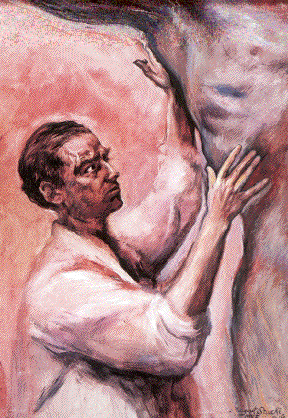
Arno Breker: The Fire of Creativity, by Margaret Stucki

Arno Breker: The Fire of Creativity, by Margaret Stucki
Books and statues are really not much more than memories for they are
perishable, and the book which is not read or the painting which is
not looked at cannot be called alive in the true sense of inhabiting
someone's consciousness. So long as one is conscious of a work of
art, so long it is alive. Old masters are old precisely because they
never died; they are aged but still alive. It takes more than the act
of creating to make a work of art live; indeed, it might be said that
it only arrives at the status of "art" when it does live in the
collective consciousness of a people. A man-made product can be
contemporary as it pleases, but it has to fight for its right to
exist as hard as any man ever struggled to keep alive. Contemporary
means with time; time itself is a fugitive and that which was with
time may very well also pass with it into oblivion. It is dangerous
for the artist to flatter Time for like most flirts she is forever
casting her eyes in the direction of the man who scorns her for
higher things.
For these reasons it is most important for the continued life of a culture to take care of its treasures for its young; colleges and museums are custodians in whose care we have placed our treasures. The responsibility of those in charge of these institutions is very great. Contact with the original works of art is the live wire through which flows the creative energy of a people. A civilization draws to its close when its people no longer honor their monuments or continue to build them.
The impulse to artistic expression can exist without becoming embodied in concrete forms. This might happen, for instance, in time of war where the artist is temporarily shouldering a rifle instead of setting up his easel. Whatever thoughts these people had are not recorded by history because they left no evidence of their being. Culture only comes into being when there is deposited by Time a definite amount of tangible material. The wisdom of Homer and Socrates was completely verbal, but other human beings became the living-paper upon which was recorded what they had said. And from the memory of one man it passed to the memory of another who, if he were literate, might choose to set it down in permanent form as Xenophon did in his "Memorabilia".
Related article: In Remembrance of Hermann Oberth - The Father of Space Flight